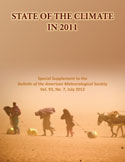 This year’s State of the Climate report [PDF], covering 2011, was published yesterday, and has made headline news around the world because of its focus on weather extremes. Can we blame some of the extremes of heat and heavy rain on continued warming? The answer — based on a new global effort to look at attribution of six of 2011’s extreme events — is yes. However, Dr Peter Dr Peter Stott, Head of Climate Monitoring and Attribution at the Met Office, and one of the lead authors of the extremes research said:
This year’s State of the Climate report [PDF], covering 2011, was published yesterday, and has made headline news around the world because of its focus on weather extremes. Can we blame some of the extremes of heat and heavy rain on continued warming? The answer — based on a new global effort to look at attribution of six of 2011’s extreme events — is yes. However, Dr Peter Dr Peter Stott, Head of Climate Monitoring and Attribution at the Met Office, and one of the lead authors of the extremes research said:
… we didn’t find evidence that climate change has affected the odds of all the extreme weather events we looked at, [but] we did see that some events were significantly more likely. Overall we’re seeing that human influence is having a marked impact on some types of extreme weather.
The UK Met Office summarised some of the key findings:
- December 2010 was the second coldest and November 2011 the second warmest in the Central England temperature record dating back to 1659. The extreme warm average temperature in November 2011 is 60 times more likely to have occurred than in the 1960s. The change in odds of the extremely cold December was considerably less, however, being only about half as likely. Even without climate change, unusual circulation patterns can still bring very cold winter months.
- In 2011, Texas had its hottest and driest summer in records dating back to 1895. While the heat wave was associated with La Nina conditions in the Pacific Ocean, the heat wave was 20 times more likely in such conditions than it would have been only 50 years ago.
- There were some remarkable temperatures across Western Europe in 2011. Comparisons to the temperatures previously associated with the weather patterns seen in 2011 reveal the year was almost 1.5 deg C warmer than can be attributed to weather patterns alone.
The paper dealing with the attribution exercise, Explaining Extreme Events Of 2011 From A Climate Perspective, by Peterson et al (BAMS, July 2012, pdf here) is well worth a read.
Below the fold: the full abstract of the State Of The Climate 2011 report – an excellent short form overview of the year…
Continue reading “State of the climate 2011: extreme heat our fault”

 An interesting
An interesting 